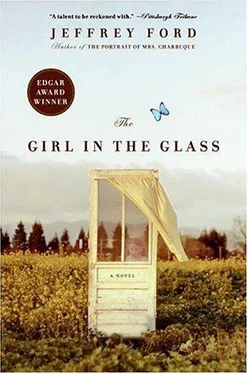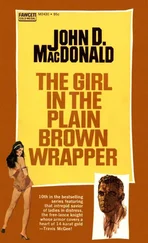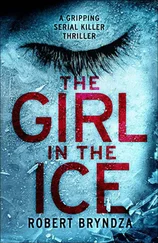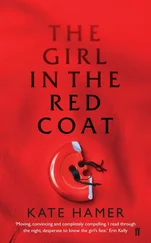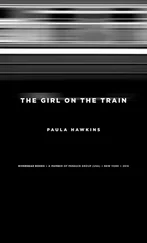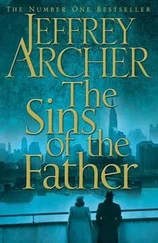The next thing I knew, Schell's eyes were partially open, and he was staring at the yellow and black flutter of the two-tailed swallowtail hovering above the table between us. He smiled wearily, and said, "The Aztecs called that specimen Xochiquetzal, which means 'precious flower.' There was a goddess who followed warriors into battle, and when they were mortally wounded and lay dying, she'd copulate with them while holding one of those swallowtails in her mouth."
"I remember my mother telling me that mariposas were the souls of the dead," I said.
"Do you think about Mexico often?" asked Schell.
"I didn't till I met Isabel," I said. "Now I'm starting to see pieces of it in my dreams. I'm remembering little bits and pieces. Funny thing is, I was just thinking about her when you mentioned the Aztecs."
"Maybe we need to take a trip back there for you to remember," he said. He turned his left hand over, and there was a bridge deck in it. Where it had come from, I'm not sure. As he began manipulating the cards, he said, "Maybe it was wrong of me to want you to forget Mexico, but I did. I thought if you carried it around your whole life, it would weigh you down with sorrow for all the things that had happened."
I smiled, not wanting to trouble him, and waved my hand. "I'd say I've been pretty lucky."
"I wonder if," said Schell, "when a caterpillar becomes a butterfly"-here, he fanned open the deck-and gains the ability to fly, it remembers what it was like to be a caterpillar?"
"It's probably just happy to be free," I said.
"Or," said Schell, closing the deck, "perhaps all of its restless movement from blossom to blossom is merely an attempt to return to and regain its caterpillar nature." He raised his eyebrows and then shrugged.
While continuing to work the deck, now with both hands, Schell eventually closed his eyes again, returning to his thoughts. His musings struck me at first as insightful and profound, but the longer I sat there the more something bothered me about what he'd said. I couldn't precisely put my finger on it, but it had to do with his equating Mexico with a caterpillar.
The next day, in between stops to let Lydia Hush get out of the car and psychically sniff the surrounding area, I entertained her and Antony with select stanzas from the Isa Upanishad. Using my swami voice, I recited the lines with a heightened solemnity that both honored and mocked the material.
"When once one understands that in oneself
The self's become all beings
When once one's seen the unity
What room is there for sorrow? What room for perplexity?"
Antony laughed and pronounced the holy utterances "double-talk," and Miss Hush praised me for my ability to memorize. She said that she could almost make out what the words were getting at. Like a child vying for attention, I milked the act for a solid hour until I began to bore myself. Afterward, we traveled in a peaceful silence broken only by Lydia's occasional whispered requests for Antony to pull over. A little while after lunch, for no apparent reason, she offered a breathy rendition of "As Time Goes By."
Her perfume carried the scent of fresh-cut lemons. It filled the car and dazed the big man and me, so that even while we waited by the side of the road for her, we kept to our own thoughts. Her pale beauty was bewitching, and it made me think of marshmallow, cream, clouds, and snow. Whenever she put her hand on Antony's shoulder to get his attention, I noticed that it caused him to shiver slightly, and I felt a stab of jealousy with each touch.
Not until the end of the day, the sky growing overcast as twilight came on, when we'd pulled over at the edge of a wood in a little town named Mt. Misery, did her spell dissipate. I sat in the front seat next to Antony, who had begun humming the tune she'd sung earlier. More than an hour had gone by since we'd last seen her drifting like a ghost amid the gray trunks beneath the darkening sky. Only then did I recall something I'd meant to tell him first thing that morning.
"Oh," I said, "yesterday, after we picked up Schell and were driving out of the Barnes place, do you remember the car that passed us?"
He took a drag of his cigarette, flicked the ash out the car window, and said, "Yeah, now that you mention it."
"I tried to get a look at whoever was in that car. I'm pretty sure it was four men-big guys too. I couldn't get a look at any of their faces, but one thing I could see was that the driver was wearing a hat."
"So?"
"I think it was that hat. You know, the one you wore when you were Parks's mother."
Antony sat still for a moment, taking in what I had told him. Then he turned to me, eyes squinting, brow furrowed. "Why?" he said.
"Same style, same color, same big brim. If I remember when we bought it at the thrift store, it was actually a man's hat."
He turned and stared out the windshield. "Oh shit," he said. "I wonder if Barnes is bringing booze in from Canada."
"Why would he?" I asked.
"I'll give you a million guesses," said Antony. He held up his right hand and rubbed his thumb and first two fingers together. "If you have a big enough operation, there's a fortune in it. You bring it in on Long Island, less cops, and you've got the city close enough to unload all of it and then some."
"Would he do something like that?" I asked.
He laughed once and rubbed his chin. "'Illegal' takes on a whole new meaning when you're loaded like Barnes. The rich have a separate rule book. To them if it makes money, it can't be wrong."
"The only thing is, we have to tell Schell," I said.
"Damn it," he said and smacked the steering wheel. "We are gonna have to tell him. I've got nothing against bootlegging. Prohibition is complete bullshit anyway, but this shows us something about Barnes that could be important. Are you sure it was that hat?"
"No," I said. "But I'm mostly sure."
"Jeez, trapped in my own spiderweb," he said. "My con is busted."
"I don't think Schell's going to care," I said. "He'll be happy to get the news about Barnes."
"Yeah, but if we tell him, you better be right," he said. "I'm gonna look like an ass."
"Why should this instance be any different?" I said.
I managed to open the door and get out of the car before Antony could grab me. He let himself out and stretched. Then he looked over at where I stood and said, "If I catch you, kid, I'm gonna wrap that turban around your neck."
"Whatever moves in this moving world, abandon it and then enjoy," I said in my swami voice.
"Enough of that," he said. "It's gonna get dark in about fifteen minutes. Where's Miss Hush?"
"She's been gone a long time," I said.
"Too long," said Antony. "We better find her."
"I think she went this way," I said and pointed at a path that wound among the trees.
We followed the path for a few minutes, looking all around, but saw no sign of our passenger.
"Miss Hush," I called out. There was no response.
We walked on a bit more until we came to a fork in the trail. "Lydia," he roared. We listened for her voice but heard only the sounds of crows in the treetops and a squirrel running through the brambles. Red leaves fell around us, joining others that littered the ground.
"Okay, kid, you go that way," he said, pointing to the right. "I'll go this way. Just keep calling her. If you don't see anything by the time it gets dark, get back to the car."
"All right," I said and took off down the path, calling her name. We yelled at intervals, and I heard Antony's voice for a good distance as I walked along. Darkness was falling quickly, and I wondered where she could have gone.
About fifteen minutes later, when I was just about ready to turn back, I thought I heard something. When I looked around, I saw a crow lift off a fallen tree and fly up between barren branches. That's when I caught sight of a small structure sitting amid a thicket of pines. It was a dilapidated old shack with a tar paper roof. There was a broken window to the left of the door, which hung crookedly from a leather strap-hinge at the top; the bottom one was torn. The place was small, and looked like it had once been a toolshed or woodshed.
Читать дальше
